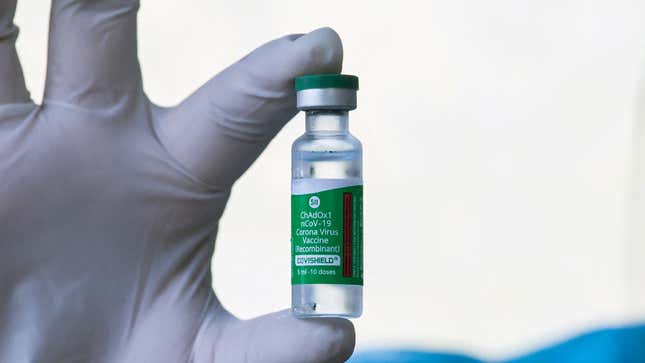
Pharmaceutical company AstraZeneca isn’t running out of rakes to step on anytime soon. Less than a day after the company announced promising preliminary results from the U.S. trial of its covid-19 vaccine jointly developed with Oxford University, an independent panel of scientists monitoring the study issued a harsh rebuttal. The group accused AstraZeneca of using “outdated” information from the trial that possibly offered an “incomplete view” of the data.
Yesterday morning, AstraZeneca unveiled the findings from what it billed as interim results from its Phase III trial in the U.S., which will determine its fate in the country as an authorized vaccine or not. The randomized, double-blinded, and controlled trial, which involved 32,449 participants, purportedly showed that the two-dose vaccine had 79% efficacy in preventing symptoms from covid-19. The vaccine also appeared to have 100% efficacy in preventing severe illness and death from the viral illness, and there were no major safety concerns identified.
The results were in line with those from other trials of the vaccine conducted elsewhere, if slightly more impressive. But later that evening, the Data and Safety Monitoring Board, an independent group of experts that helps oversee government-funded clinical research in the U.S. (the AstraZeneca trial included), called foul. The group notified the National Institute of Allergy and Infectious Diseases, the Biomedical Advanced Research and Development Authority, and AstraZeneca of concerns they had with the data release.
According to a statement made Tuesday by NIAID, the group “expressed concern that AstraZeneca may have included outdated information from that trial, which may have provided an incomplete view of the efficacy data.”
These vaccine trials are supposed to work by tracking how many people in each group (placebo and vaccine) develop the targeted illness, within earlier set parameters. The primary endpoint is typically based on reaching a certain number of total “events”—in other words, diagnosed cases of the disease across both groups. The primary endpoint of the trial was said to have already been reached by the time of the company’s interim analysis, according to AstraZeneca. But the Data and Safety Monitoring Board appears to be alleging that the results could be noticeably different, and perhaps less rosy, if more current data from the trial was used.
This morning, the company issued its own statement claiming that its preliminary study results were taken from a pre-established cutoff date of February 17. Furthermore, it claimed to have run the numbers from its intended primary analysis and that these results were “consistent” with the results released yesterday.
“We will immediately engage with the independent data safety monitoring board to share our primary analysis with the most up to date efficacy data. We intend to issue results of the primary analysis within 48 hours,” the company stated.
This is far from the first controversy faced by AstraZeneca over its vaccine, which is already authorized for use in Europe and elsewhere. This month, more than a dozen countries in the European Union temporarily suspended their rollout of the vaccine after receiving a few reports of serious blood clotting possibly tied to the vaccine. However, the EU’s health regulators reaffirmed the vaccine’s safety late last week.
The clotting issue doesn’t appear to be the result of any misstep by the company, and it is still not known whether there is any heightened risk of rare related complications from the vaccine. But AstraZeneca has previously done itself no good over its communications with health regulators and the public. Last fall, it neglected to immediately admit to mistakes made during clinical trials in the UK, which led to some people receiving a smaller dose of the vaccine than planned. In the summer, the U.S. suspended its trial for over two months after health regulators were reportedly concerned by the company’s lack of transparency in reporting isolated cases of neurological injury that were possibly tied to the vaccine as well.
These stumbles aside, the vaccine does seem to be safe and effective. In the UK, which was the first country to approve the vaccine last December and has had a very successful rollout of its three authorized vaccines to date, cases and deaths attributed to covid-19 continue to decline. That’s in sharp contrast to much of Europe, which is facing a third wave of the pandemic and has been hampered by a limited vaccination campaign.
All of which is to say, this is yet another avoidable blunder that likely won’t change the big picture—that the AstraZeneca vaccine is generally safe and effective—but could further erode the public’s trust in this shot, which stands to be a crucial tool in ending the pandemic worldwide.